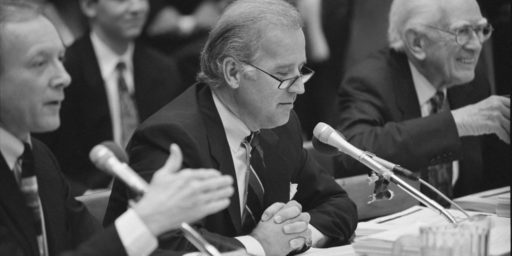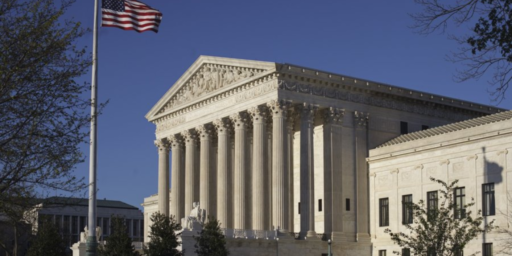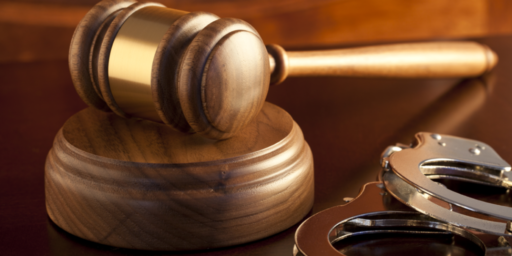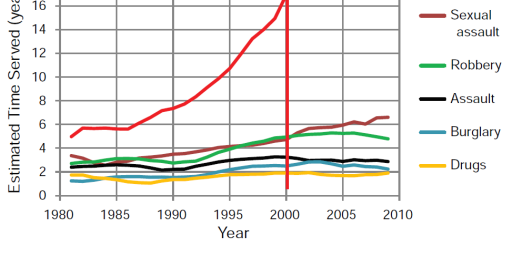Mass Incarcation Era Over?
 After decades of maintaining the highest incarceration rates in the developed world, the United States is shifting toward alternative sentencing for all but the most dangerous criminals, Adam Serwer reports.
After decades of maintaining the highest incarceration rates in the developed world, the United States is shifting toward alternative sentencing for all but the most dangerous criminals, Adam Serwer reports.
In the 1980s and 1990s — the “tough on crime” era — -incarceration was touted as the simple solution to our crime problem. Today, the United States imprisons 1 percent of its entire population. Including the number of people on probation and parole, one in 31 Americans is under supervision of the criminal-justice system. Mass incarceration has succeeded in reducing crime, but the strategy has diminishing returns. The offense rate of the top 20 percent of offenders is more than 10 times that of the average prisoner — a few very active criminals commit most of the crime. But under the current system, offenders who could be more cheaply deterred or rehabilitated instead incur the most expensive — and, from the perspective of its effect on the community, damaging — form of punishment possible. This is why, even as the number of incarcerated people has increased exponentially, crime hasn’t decreased at the same rate.
Fueled by the damage mass incarceration has done to state budgets, a new “smart on crime” movement has emerged to seek new ways of reducing the number of people in the system. Many states, including New Jersey, have attempted to do so by reforming probation and parole, in part by using something called “graduated sanctions” — levying small punishments on those who violate the terms of their supervision. Instead of being thrown back in jail, parolees are confined in short-term residential assessment centers — privately run institutions where they are evaluated. The parole board, based on recommendations from the parole officer, then decides the best course of action: revoking parole, placing the offender in a work or treatment program, or putting him on position-monitoring (using the ankle bracelet), which is one of the harsher sanctions in New Jersey.
[…]
America is slowly inching away from decades of a draconian approach to criminal justice — one that has resulted in the “land of the free” imprisoning more of its citizens than any another country in the world. In Congress, bills to repeal the sentencing disparity between crack and powder cocaine are gathering momentum. The new head of the Office of National Drug Control Policy, Gil Kerlikowske, has abandoned the “drug war” rhetoric. Religious conservatives commiserate with bleeding-heart liberals over what to do about recidivism. In states like New Jersey, officials are thinking of creative ways to curb offending behavior without relying solely on incarceration. Although ideas like graduated sanctions have been around for years, they are now being implemented in earnest as states seek new strategies for deterring crime rather than simply punishing it.
“We have the emergence of a very pragmatic, non-ideological crime-policy conversation that is allowing us to set aside philosophical differences to reduce crime and prisons,” says Jeremy Travis, president of the John Jay College of Criminal Justice. “This is the great breakthrough of the last decade.”
There’s much more in the piece, which I recommend in full.
Alternative sentencing makes sense in the case of most nonviolent and low level offenders, since incarceration is not only incredibly expensive but can reinforce criminal behavior and ensures that the offender can’t provide for his family, creating spillover effects into the community. It would also be useful to revisit much of our criminal law, notably drug and other vice law, to decriminalize conduct that doesn’t cause direct harm to others.
via Annie Lowrey
UPDATE: Ross Douthat writes about this issue in his NYT column. He argues that mass incarceration made sense as a reaction to the overindulgent 1960s and 1970s, it’s time has passed.
Yet the costs of this success have been significant: 2.3 million Americans are behind bars. Our prison system tolerates gross abuses, including rape on a disgraceful scale. Poor communities are warped by the absence of so many fathers and brothers. And every American community is burdened by the expense of building and staffing enough prisons to keep up with our swelling convict population.
Mass incarceration was a successful public-policy tourniquet. But now that we’ve stopped the bleeding, it can’t be a permanent solution.
This doesn’t require a return to the liberal excuse-making of the ’60s and ’70s. Nor does it require every governor to issue frequent pardons. (A capricious mercy doesn’t further the cause of justice.)
Instead, it requires a more sophisticated crime-fighting approach — an emphasis, for instance, on making sentences swifter and more certain, even as we make them shorter; a system of performance metrics for prisons and their administrators; a more stringent approach to probation and parole. (“When Brute Force Fails,” by the U.C.L.A. law professor Mark Kleiman, is the best handbook for would-be reformers.)
Above all, it requires conservatives to take ownership of prison reform, and correct the system they helped build. The Democrats still lack credibility on crime policy. Any successful reform requires the support of the law-and-order party.
This is an issue where the politics will trail the facts considerably, however.






I suspect this will last until a few of the “low risk” criminals show why it is not “no risk” in a high profile way.
The problem comes from a line in the quoted article: “Mass incarceration has succeeded in reducing crime, but the strategy has diminishing returns.”
I mean, I agree with you on this issue. At least I think I do. But the reality is that our crime rate has dropped dramatically over the past 20 years during this period of mass incarceration. And I know the social science research suggests alternative explanations. But I find it hard to have confidence in suggesting a dramatic shift.
I’d think you’d want to start with small steps, decriminalizing marijuana for example, and see where it leads.
A lot of what has happened over the last several months has not received a lot of publicity and thus little chance of backlash . . . yet. Yesterday, the Governor of Illinois suspended the state’s early release program when news stories disclosed what was going on. LINK And one more word: Hucklebee.
I think the last few decades have been more the culmination in lack of trust in the discretion and risk assessments of judges and politicians, than concerted policy. And that came from the right (angry at crimes committed after light sentencing) and the left (angry that those with more economic and family resources served less time).
Also this gauzy look at enlightened progress overlooks the increased use of criminal registration (particularly sex offenses, but not exclusively). Land of the free?
There’s not much doubt that locking away everyone who has committed any infraction for a long time will reduce crime. But the “diminishing returns” comes from the fact that most crimes are committed by a handful of career criminals. Once you get to the long end of the tail, you’re investing a lot of money in locking up fairly harmless folks.
It’s about time. Here in Colorado, this has been a hot topic viz-a-viz DUI sentencing. (Some background here.)
The law and order approach has its merits, but it’s not a cookie-cutter solution to everything.
I’m all for harsh penalties for DUIs, but I’m under no illusion that if we just made them even harsher, then that would deter drunk drivers from getting behind the wheel.
That kind of crude behavorial calculus rarely works for sober, rational individuals much less those who have had too much to drink!
You want to reduce DUIs? Don’t institute mandatory minimums and harsher penalties. Invest in public transportation.
Of course, we won’t. Why “reward” drunks for getting too drunk to drive by providing a safe way to get home?
Better to just punish them for not thinking straight when they’re drunk, right?
Legalize pot and you empty a lot of jails and prisons. The idiocy of sending some innocent pothead to jail so he can be beaten, raped and offered protection for membership in a criminal gang is so amazingly stupid it could only have come from the conservative mind. (That would be the ‘credibility’ Douthat thinks conservatives have.)
We should legalize and tax pot and sell it with the same restrictions as alcohol — an infinitely more dangerous drug. We can see how that works (seems to be working pretty well in Europe where it’s either legal or effectively decriminalized in most countries) and in the meantime eliminate prison sentences for possession of other drugs as well.
As for DUI’s, seize their cars. That’s the kind of sentence that gets people’s attention and goes a good way toward making it impossible to repeat the offense.
I think that one of the problems in enforcing laws against driving while under the influence is that judges tend to view the accuseds too sympathetically. That the rate of alcoholism in the practice of law is something like double what it is in the general population might have something to do with it. They can see themselves standing in the dock.
Why not just execute them? That would get people’s attention too and make sure there are no repeat offenders.
I’m with you on marijuana legalization, but count me out of the ever more draconian penalties for drunk driving. Just what governments need…more authority to seize private property.
Depends on the state’s mandatory minimum statutes, I guess. A judge with no discretion won’t have much ability to go easy on a fellow drunk.
The problem with drunk driving law enforcement is not that the punishments are insufficiently severe. It’s not that that judges are too lenient in carrying out those punishments.
It’s that the likelihood of getting caught is minuscule. Some 2/3 of drunk drivers meet the criteria of being alcoholics. The same is true of 9 of 10 repeat offenders. These people probably drove drunk 1,000 times before they got caught. It’s a roulette game with a thousand-bullet chamber.
I used to go to bar music shows with a lot of regularity. I would say that probably 3/4 of those leaving the bar are legally drunk (a ridiculously easy standard to meet). Are all of them going to call cabs? Do you arrest all of them? How?
The topic is so well worn I don’t have the patience for a long dissertation. Simply: If you want to empty the jails, reduce incarceration costs and – most importantly – put a real dent in the gangs and the associated horrible social malformations, you should decriminalize pot and cocaine right now. Right now.
As for DUI. Illinois has instituted an interesting policy. For first time DUI (.08 here) you must install a device that you blow into to start the car – and every ten minutes thereafter – else the car’s lights flash and horn honks. Or you can take a 6 month license suspension.
Me, I’d set the DUI limit at a higher level, and also absolutely nail multiple offenders. What this policy is doing in my social circle is causing us not to take a 15 minute drive into town to the restaurants. A couple bottles of wine and you’re right near .08. Who can afford the penalty? (And the cops sit in parking lots near restaurant exits just waiting.)
Instead, people are throwing dinner parties at home, keeping travel to 3-5 minutes, staying away from downtown and out of harm’s way.
Of course, I get to show off my wine collection. So not all bad.
As for DUI. Illinois has instituted an interesting policy. For first time DUI (.08 here) you must install a device that you blow into to start the car – and every ten minutes thereafter – else the car’s lights flash and horn honks. Or you can take a 6 month license suspension.
Every ten minutes? That’s a little excessive. What are the odds that someone is going to get drunk in ten minutes while on the road? It seems to me that the distraction of breathing into that thing creates more of a hazard.
Here’s my Audi-sepcific drunk test: if you can program the navigation system and then switch to the stereo you are legally sober.
The prison statistics don’t show an increase in non-violent incarceration over the last decade or two. The largest increase in incarceration is for violent offenses.
Trumwill –
To prevent the sober guy from blowing upon ignition, and then the drunk guy actually driving the car.
Think operationally.
“Here’s my Audi-sepcific drunk test…”
(From Audi Owner) Now THAT’S entertainment!
While I agree overall that criminalizing pot is stupid and legalizing it is a good first step, both conservatives and liberals have been pretty much on the “tough on crime” band wagon.
Pretty much agree with this too.
Hmmm, lets see, looks like Drew, Michael, me, and Bernard are largely in agreement. Has Hell frozen over?
Steve V –
It has. See what happens when you just comment on the issues straight up as you see them (not always through the prism of a right or left partisan, if I might) as I always (attempt) do? And methinks you do too. I think we probably are fundamentally libertarian, with certain practical roots.
I’m sure Reynolds sees me as a right wing idiotic etc……….but here I am. And I even gave the “soft” version of my views. I’d decrim alot more. This is a monster problem destroying America.
Clearly we’re all high.
Drew:
I’d decriminalize pretty much anything that occurs between consenting adults and doesn’t involve violating person or property or threaten same.
“I’d decriminalize pretty much anything that occurs between consenting adults and doesn’t involve violating person or property or threaten same.”
Sir, I find myself in almost complete agreement……..and I’m not high.
Of course, its the perceived third party threat where the trouble starts……
Our pot laws are stupidity on an epic scale. Legalize it and tax it. Now.
“Incarcation”?
For a moment I thought I was over at Matt Yglesias’ blog. 😉
Heh. Unfortunately, there’s no spell check in the title field.